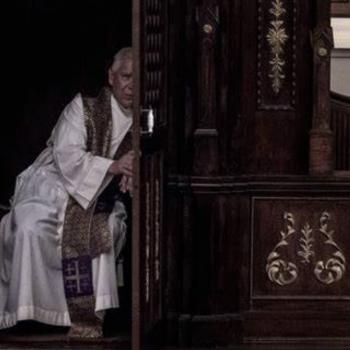In anticipation of the 50th anniversary of Humanae Vitae this summer, Sick Pilgrim will be featuring a series of essays on Natural Family Planning, the only acceptable method of achieving or avoiding pregnancy according to the teaching of the Catholic Church. These essays will not present ideological stances or theological arguments, but will simply offer unvarnished testimony from individuals who have used NFP. The struggles and sufferings that NFP carries with it frequently go undiscussed, and we wanted to offer a space for honest conversation. The essays are being posted anonymously to protect the privacy of the writers, who otherwise might not feel comfortable telling their stories. When it comes to NFP, “all things conspire to keep silent…half out of shame perhaps, half as unutterable hope” (Rainer Maria Rilke). We want NFP to work, and when it doesn’t, we keep silent and believe our struggles are unique. It is the hope of the editors of Sick Pilgrim that these essays will be a source of hope to those who struggle with NFP, and will convey the message: You are not alone.
***
I am, perhaps, an unlikely critic of NFP. When I was 14, the religion teacher in my Catholic school explained the theology behind the Church’s prohibition on contraception. I was utterly convinced by it. The Church’s theology of sexuality made perfect sense to me. It spoke to my heart, and I felt that it was true with the same certainty with which I knew that 1+1 =2.
My husband and I have used NFP and tried to follow Church teachings for the entirety of our married life. It hasn’t always been easy, but it’s something we’ve been committed to. I own numerous books on NFP and on the Theology of the Body. There were times when I thought about becoming an NFP instructor. Until recently, I would have considered myself very supportive of the Church’s teaching and of NFP. Lately, however, there has been a shift in my thinking. This shift happened partly because of the NFP experiences of a friend, and partly because of what happened to me after she shared these experiences with me.
My friend is a wonderful person, a devout Catholic, and very pro-life. She and her husband were using NFP, and had been for years. Unfortunately, over the course of her married life, my friend has suffered several traumatic miscarriages. She has struggled with severe depression and PTSD related to pregnancy loss. In addition to her miscarriages, she also has four living children who suffer from a variety of physical and emotional ailments. Her children have been in and out of specialists’ offices, therapist appointments, and hospitals. Given these circumstances, her anxiety surrounding the possibility of another pregnancy was extreme. It seemed like every time we got together, all she was able to talk about was how afraid she was of becoming pregnant. To make matters worse, her husband had minimal tolerance for the periodic abstinence required by NFP. The possibility of her becoming pregnant was actually quite high. I began to be afraid that, if she did become pregnant, she would attempt to commit suicide.
One weekend in early autumn, I suggested that we take a trip out to the Blue Ridge, just the two of us, to go apple picking. I hoped that an afternoon away would give her a respite from her anxiety, and a change in routine, though I also knew that it was only going to be a temporary break. As we drove away from the city, we were chatting cheerfully about recipes and movies we’d seen recently. But the time we were driving home, tired after an afternoon out, we had returned to the familiar subject.
As we neared home, she became more anxious, and she finally told me that she had decided that if she became pregnant, she was going to have an abortion. I was not shocked. I knew how much she feared another miscarriage, and I knew how wholly overwhelmed she felt. I also knew that this would be absolutely catastrophic for her. She was passionately pro-life. She was terrified of losing another child. For her to have an abortion would, I felt, simply be a step on the way to her becoming suicidal.
I told her that I thought that this was the time for her and her husband to consider using contraception. I didn’t say this lightly. I have my religious commitments. In the back of my mind, I was hoping that using contraception would be temporary, something to give her peace of mind so that she could have some time to heal before going back to following the Church’s teachings. But I knew that contraception was absolutely necessary to her, at least short term. Things could not go on the way they were heading. She needed a break from constant fear.
Whether she took my advice or not, I couldn’t say. I know that our topics of conversation changed after that, that she began to place distance between the two of us. Whether that’s related to our conversation, I don’t know. People are complicated.
Part of me was, and is, certain that the advice I gave was good. But, I am prone to scrupulosity, and so I soon made an appointment to talk with my parish priest. He was very encouraging. He told me that things happen that are very difficult for couples. Sometimes, this really is the best advice for a given situation, even if the Church’s teaching is true. I was relieved, but my conscience was not satisfied. We had talked so long that I had run out of time, and I didn’t get to ask him to hear my confession. My conscience was still bothering me, and it sent me to confession to a different priest when I was traveling a few weeks later.
This priest had a different assessment of the situation. He told me that I had not said the right thing. He said that this was something that my friend and her husband had to work out on their own. He also told me that I could not control whether or not my friend committed suicide, and I shouldn’t try. All I could do, he said, was make sure that she committed suicide in a state of grace, without the sin of contraception on her soul.
I consider this the worst advice I have ever been given. I was shocked. I was horrified. I have been re-evaluating my relationship to the Church’s teaching on sexuality ever since.
One priest offered a way of accompaniment. He encouraged me to accompany my friend, and offered to speak to her himself. He did not reject the Church’s teaching outright, but he did advocate flexibility.
The other priest insisted on rigor, and he considered women’s lives an acceptable price to pay for this purity and rigor. All the criticisms that the Church devalues women seemed to be vindicated by his words.
Much as I would like to dismiss him as a crank and an outlier, when I reflect on my experiences with other NFP users, I have to admit that he isn’t an outlier. My parish priest’s advice would have been condemned by most of the NFP Catholics I know. I have heard them condemn priests who offer flexibility on contraception. I have been that Catholic who shakes her head at those lax priests.
And so this is what troubles me. I don’t necessarily say that the Church’s teaching on contraception is wrong, but my experience leads me to think that the way of accompaniment requires flexibility, perhaps even “laxness,” whereas the way of rigor leads to a Church that is comfortable with death.
The essays in Sick Pilgrim’s You Are Not Alone series are written anonymously by Catholic women and curated by editor Maren Grossman.













